Exchange and mutual contact are essential
The exchange of information and the possibility of direct contact between scientists and the relevant federal institutes and authorities is far more important than simply accessing data from the reporting processes in human and veterinary medicine. This was the conclusion drawn by the participants of the workshop "Electronic Reporting", to which the National Research Platform for Zoonoses invited participants on 1 and 2 July 2010 in Berlin. The event served to take stock of all reporting procedures in human and veterinary medicine and aimed to assess the benefit of public-use files - reporting data accessible to scientists and the public.
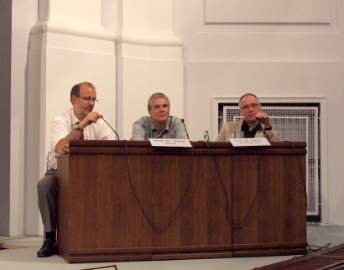
Speakers at the workshop in Berlin
Data is not equal to data
Whether there are epidemiological links between Q-fever outbreaks in humans and cattle, or whether salmonella outbreaks in children after eating meals in communal facilities are linked to the presence of poultry in the same county is unlikely to be answered quickly and comprehensively by a simple analysis of the available data sets. At the very least, it would first be necessary to examine in detail the criteria used to collect the data in question, the purpose for which they were collected and the accuracy with which they are available in the accessible databases.
The legal bases for the reporting processes and the associated mandates for data collection vary widely. For this reason, the data cannot be automatically compared. This became clear from the remarks of Dr. Tim Eckmanns (Robert Koch Institute, RKI) and the head of the Institute of Epidemiology of the Friedrich-Loeffler-Institute, PD Dr. Franz J. Conraths. Data collected for the monitoring of a process cannot be equated with data collected for a specific research question or for prevention or information purposes, also emphasised Prof. Dr. Lothar Kreienbrock, statistician at the Foundation of the University of Veterinary Medicine Hannover.
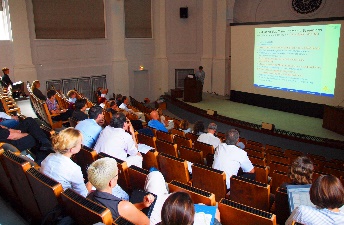
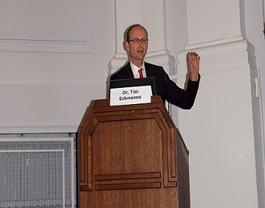
Participants at the Empress Friedrich Foundation Berlin; Dr. Tim Eckmanns (Robert Koch Institute, RKI)
In particular, data from food monitoring, such as those collected by the Federal Institute for Risk Assessment (BfR) and the Federal Office of Consumer Protection and Food Safety (BVL), are obtained from random sampling, so that they yield both positive and negative results. This means that they cannot be compared with pure "case numbers" of reported infected humans or animals or with the large number of reported cancer cases that are available at the Centre for Cancer Registry Data at the RKI.
In addition to the collection of data, the workshop also focused on the reporting and transmission channels - electronic, by fax or by telephone - as well as on the analysis of the interactions between the respective parties involved in the Austrian Cancer Registry: from the health, veterinary and food inspection offices to the regional offices and the federal institutes. Dr. Gabriele Sinn from the District Health Office in Charlottenburg-Wilmersdorf in Berlin explained that in human medicine, most reports are made in paper form. In veterinary medicine, on the other hand, from the official veterinarian to the Federal Institute, all data is collected digitally, as Dr. Carolina Probst (FLI) summarized.
Cooperation between science and ÖGD can still be expanded
If the epidemic situation so requires, the relevant authorities and research bodies already communicate with each other very well and in detail. This was reported by Dr. Stefan Brockmann from the State Investigation Office in Baden-Württemberg. In principle, however, the exchange between ÖGD/authorities and scientists still needs to be improved. The workshop in Berlin was a first step to optimize this exchange.
Reporting morale in the medical profession varies
The participants assessed the relevance of certain reporting processes very differently. For example, the report from the physician to the public health department, which is usually an additional report to the laboratory report, was partly considered subordinate, partly essential and in urgent need of improvement. The difference in reporting morale between East and West, but also within individual federal states, is striking. Overall, there was agreement that the positive incentives for physicians to consistently report notifiable diseases should be strengthened.
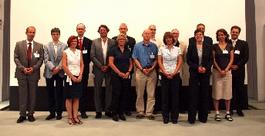
Speakers of the workshop (photo: Research platform of zoonoses)
Standardized software to support the processes
The reporting processes could be supported by suitable reporting software, which on the one hand could facilitate the formal tasks of the physician and at the same time optimise the time-consuming data sorting and forwarding in the offices. Frank Oemig (Agfa Healthcare and member of the HL7 standardisation committee) emphasised that software is essential for this, which would have to be standardised worldwide and could then simplify the reporting process from the doctor to the authorities and international committees. Internationally valid catalogues, which can serve as a basis for this, are already being developed and are currently being coordinated internationally, explained Dr. Sylvia Thun from the German Institute for Documentation and Information (DIMDI).
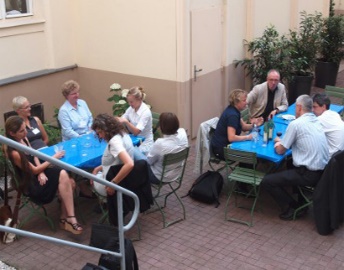
Participants discussing during the break
Dr. Charlott Meyer (Federal Ministry of Health, BMG) explained how the telematics infrastructure for the health care system can also be sensibly used for electronic reporting in medicine. She presented a project within the framework of the Chancellor's IT summit, which is located at the BMG and cooperates with the RKI and selected laboratories. The discussion revealed that the transition from pilot projects to a generalised approach is often difficult, as this can lead to high short-term costs for the acquisition of standardised solutions.
Close cooperation between ÖGD and research necessary for the future
The participants of the workshop discussed the desire to further intensify the exchange initiated in the event in the near future and to expand the newly established contacts. The expansion of the database internet portal of the National Research Platform for Zoonoses as a cooperation and contact exchange as well as the planned documentation of the inventory of the reporting system in the form of a conference proceedings will support this development.
Presentations of speakers
Program
Poster
More links on this topic (german):
Radiobeitrag zum Workshop "Elektronisches Meldewesen" im Deutschlandfunk
Interview mit Dr. Sylvia Thun (DIMDI), Frank Oemig (AgfaHealthcare/HL7) und Dr. Gérard Krause (RKI)
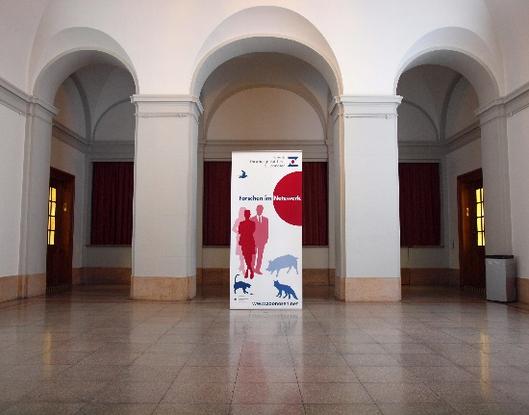
Scientific direction
Prof. Dr. Wolfgang Hoffmann, Universität Greifswald, Greifswald
Prof. Dr. Heinrich Neubauer, Friedrich-Loeffler-Institut, Jena
Sebastian C. Semler, TMF e. V. Berlin
Conference venue
Kaiserin-Friedrich-Stiftung Berlin
Robert-Koch-Platz 7
10115 Berlin-Mitte
Webseite: www.kaiserin-friedrich-stiftung.de



